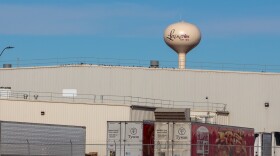A sprawling, low-profile conglomerate based in Merriam, Kansas, owns a pork processing plant in Guymon, Oklahoma, that has become one of the country's latest coronavirus hotspots.
More than 110 workers at the Seaboard Foods plant had tested positive for the virus as of Monday, according to the company.
Seaboard Foods is a unit of Seaboard Corp., the only Fortune 500 company based in the Kansas City area. Though it keeps a low profile locally, the publicly traded company has far flung interests in pork, turkey, commodities trading and shipping. It reported more than $6.8 billion in revenue last year.
Along with Triumph Foods, another pork industry leader, Seaboard is also a partner in a joint venture that owns a large pork processing plant in Sioux City, Iowa. Eleven workers at that plant had tested positive for the coronavirus as of last week.
Triumph Foods also owns a large pork processing plant in St. Joseph, Missouri, where 373 employees and contract workers had tested positive for the coronavirus as of Monday. All of them were asymptomatic. Seaboard has no ownership interest in the St. Joseph plant but it does have a sales and marketing agreement with it.
Seaboard was ranked No. 3 in hog production and No. 4 in pork processing in the U.S. in 2019, according to the company’s annual report with the Securities Exchange Commission.
In its most recent quarterly filing with the SEC, it warned that even a temporary closure of its pork processing plants “could have a material adverse effect on liquidity and financial results.”
In the first quarter of 2020, pork accounted for $455 million of Seaboard’s nearly $1.7 billion in sales and more than half its operating income.
Seaboard did not respond to KCUR’s request for comment about conditions at its pork plants in Guymon or Sioux City. But in a statement Monday, the company said it was following guidance from the Centers for Disease Control and Prevention to ensure worker safety.
"Our message to employees continues to be if you don’t feel well please stay home, contact your healthcare provider and get tested,” the statement said. “We believe this is the best way to protect our workers and our community. To that end, we continually reinforce the importance of self-isolation and testing through the local health departments, and we have actively encouraged our employees to get tested if they are feeling ill. Additionally, if anyone shows symptoms or a fever at our plant, they are asked to go home.”
Some of the workers at the Guymon plant have disputed the company’s assertions.
The Oklahoman newspaper reported on Monday that several former and current employees said the plant was not safe “and that management told employees the plant would not close under any circumstances and anyone who doesn’t show up to work could be replaced.”
The newspaper reported that the employees said workers “toiled in crowded conditions amid unenforced screening protocols and improper cleaning procedures.”
The plant employs about 2,700 people and makes roughly 4.2 million pounds of pork products per day.
Meat production plants have become coronavirus hotspots because, like prisons and nursing homes, which have also experienced disproportionately high infections and deaths, they feature individuals in close proximity to one another.
Nearly 5,000 workers at 115 meat and poultry processing plants in 19 states have come down with the coronavirus and 20 have died, according to a report last week by the CDC.
“Factors potentially affecting risk for infection include difficulties with workplace physical distancing and hygiene and crowded living and transportation conditions,” the CDC report said.
Drawing on news accounts, company press releases, state data and its own reporting, the Midwest Center for Investigative Reporting came up with even higher tallies than the CDC.
“There have been at least 9,300 reported positive cases tied to meatpacking facilities at at least 167 plants in 28 states, and at least 45 reported worker deaths at 24 plants in 15 states,” the center reported nearly three weeks ago.
Workers at the Smithfield plant in Milan, Missouri, sued the company nearly two weeks ago, accusing it of failing to provide workers with sufficient protective equipment; forcing them to work shoulder to shoulder; giving them insufficient opportunities to wash their hands; discouraging them from taking sick leave; and failing to implement a plan for testing and contact tracing.
Smithfield has denied the allegations, saying it is following CDC and local health officials’ guidance to ensure worker safety. A judge is expected to rule any day on whether to grant the worker’s request to force the plant to adopt additional safety measures.
In the last month, three large meat production companies, Tyson Foods, Smithfield Foods, and JBS USA, have shut down pork plants because of the spread of the virus. The plants collectively produce 15 percent of America’s pork.
Clarification: This story has been revised to indicate that Seaboard has a marketing and sales agreement with Triumph Foods in connection with the latter's pork processing plant in St. Joseph.
Copyright 2020 KCUR 89.3








